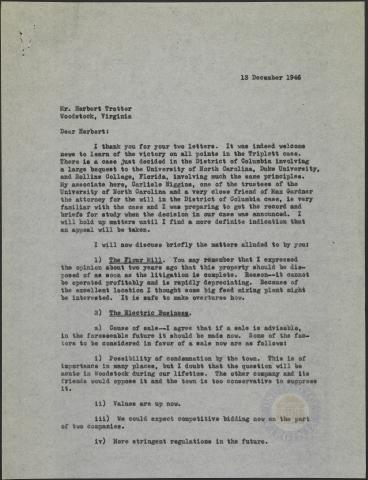
Page 1
| Parent | Mr. Tavenner's Investment situation |
|---|---|
| Date | 13 December 1946 |
| Language | English |
| Collection | Tavenner Papers & IMTFE Official Records |
| Box | Box 3 |
| Folder | General Reports and Memoranda from December 1946 |
| Repository | University of Virginia Law Library |
13 December 1946
Mr. Herbert Trotter
Woodstock, Virginia
Dear Herbert:
I thank you for your two letters. It was indeed welcome news to learn of the victory on all points in the Triplett case. There is a case just decided in the District of Columbia involving a large bequest to the University of North Carolina, Duke University and Rollins College, Florida, involving much the same principles. My associate here, Carlisle Higgins, one of the trustees of the University of North Carolina and a very close friend of Max Gardner the attorney for the will in the District of Columbia case, is very familiar with the case and I was preparing to get the record and briefs for study when the decision in our case was announced. I will hold up matters until I find a more definite indication that an appeal will be taken.
I will now discuss briefly the matters alluded to by you:
1)The Flour Mill. You may remember that I expressed the opinion about two years ago that this property should be disposed of as soon as the litigation is complete. Reason – it cannot be operated profitably and is rapidly depreciating. Because of the excellent location I thought some big feed mixing plant might e interested. It is safe to make overtures now.
2)The Elective Business.
a.Cause of sale – I agree that if a sale is advisable, in the foreseeable future it should be made now. Some of the factors to be considered in favor of a sale now are as follows:
i.Possibility of condemnation by the town. This is of importance in many places, but I doubt that the question will be acute in Woodstock during our lifetime. The other company and its friends would oppose it and the town is too conservative to suppress it.
ii.Values are up now.
iii.We could expect competitive bidding now on the part of two companies.
iv.More stringent regulations in the future.
